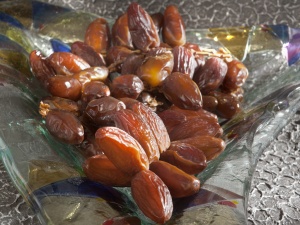DATES
Arab cultures consider dates to be “the staff of life”. They are widely prized as a constant source of nutrition and sweetness. Our partner Athos began planting date palms in Peru 4 years ago, and exporting in 2014.
REASONS TO EAT IT
- Dates are highly nutritious and calorific
- Dates help reduce catarrh in the respiratory system and soothe the airways
- Dates are recommended for fatigue or weakness at any age, and are very good for pregnant women.
VARIETIES
There are various date varieties, including Medjoul, Amary, Deglet Nour, Dayri, Malawi and Zahidi.
PACKAGING FORMATS
We sell our dates in 2 and 5 kilo boxes, on the branch and loose.
BRANDS
We distribute our dates under the brand: Athos.
NUTRITION INFORMATION
Dates are very nutritious, with a high sugar content. They also contain a high percentage of protein, calcium, phosphorus, iron, B group vitamins and vitamin A. They are rich in fibre and cellulose.values per 100 gr Calories 275 Kcal. Protein 1.97 gr. Carbohydrates 73.51 gr. Fibre 7.5 gr. Calcium 32 mg. Iron 1,15 mg. Vitamin C mg. Cholesterol 0 mg.
Their mineral content makes them ideal for treating anaemia and for convalescents.
A hundred grammes of dates provides the daily iron requirement.
ORIGIN AND CHARACTERISTICS
Date palms originate in western Asia, the Middle East and Egypt.
Dates, the fruit of the palm tree, hang off it in large bunches. It belongs to the Arecaceae family. The fruit is oval and 4 to 8 cm long. Depending on the variety, they may be yellow or brown when ripe. Their glossy skin covers pale flesh with a stone or pit inside.
STORAGE AND CONSUMPTION RECOMMENDATIONS
Dates are eaten raw, when fully ripe. Oil is extracted from the seeds, which can also be ground to produce a coffee substitute. The fruit is also used in salads, cooked dishes and yoghurts.
Dates should be stored in a cool, dry place to keep them in perfect condition for eating. Some very fleshy varieties such as Medjoul can be frozen for long periods.
Optimal refrigerator temperature: 2 ºC.





